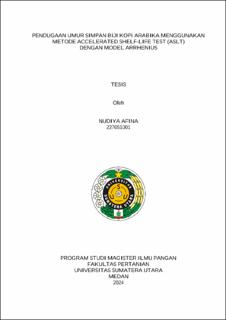Pendugaan Umur Simpan Biji Kopi Arabika Menggunakan Metode Accelerated Shelf-Life Test (ASLT)dengan Model Arrhenius
Shelf-Life Prediction of Arabica Coffee Beans Using the Accelerated Shelf-Life Test (ASLT) Method by Arrhenius Model

Date
2024Author
Afina, Nudiya
Advisor(s)
Sinaga, Hotnida
Lubis, Zulkifli
Metadata
Show full item recordAbstract
The high level of coffee consumption in Indonesia is one of the factors that
causing an increase in coffee production. The increase in coffee production must
be accompanied by maintenance of coffee beans quality, namely by storing and
selecting the right type of packaging so as to maintain the quality. A decrease in
the quality of coffee beans can cause a decrease in the shelf-life. The shelf-life of
coffee beans can be determined based on changes that occur in the quality of the
beans during storage using the Accelerated Shelf-Life Test (ASLT) method.
Therefore, research on the shelf-life of coffee beans is needed. This study was aimed
to estimate the shelf-life of coffee beans using the ASLT method with the Arrhenius
model based on caffeine content, moisture content, and taste value parameters. This
research was conducted using 4 types of packaging, namely aluminum foil,
grainpro, paper, and jute sack, and with 3 temperature levels, namely 30°C, 40°C,
and 50°C. From the research conducted, it was found that the ASLT method and
Arrhenius model is suitable for estimating the shelf-life of coffee beans, resulting in
coffee beans packed with grainpro packaging had the longest shelf life compared
to other packaging. With caffeine content as a benchmark, coffee beans can last up
to 148 days at 30°C, 59 days at 40°C and 25 days at 50°C. Meanwhile, with
moisture content parameter, the beans can last up to 46 days at 30°C, 21 days at
40°C and 11 days at 50°C. In addition, if the taste value is used as a benchmark,
the beans can last up to 45 days at 30°C, 21 days at 40°C and 10 days at 50°C.
Collections
- Master Theses [55]
